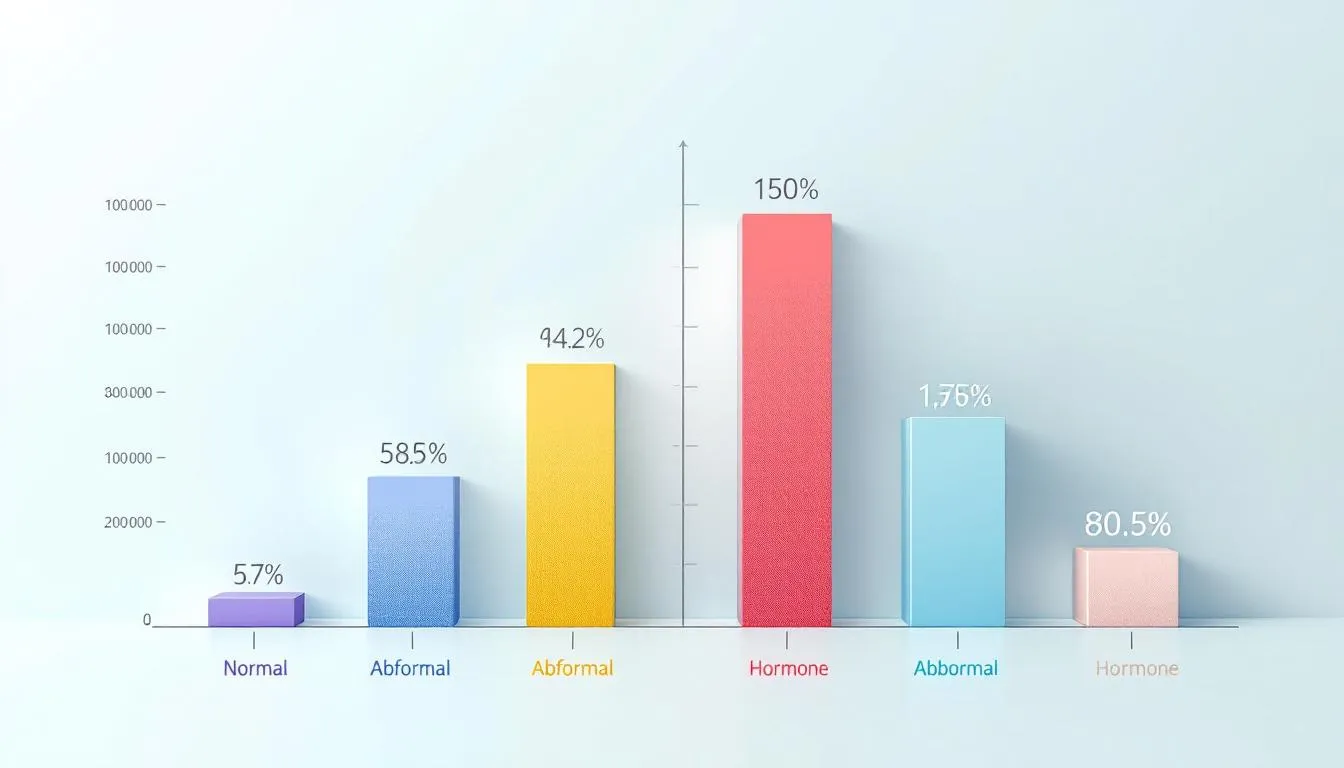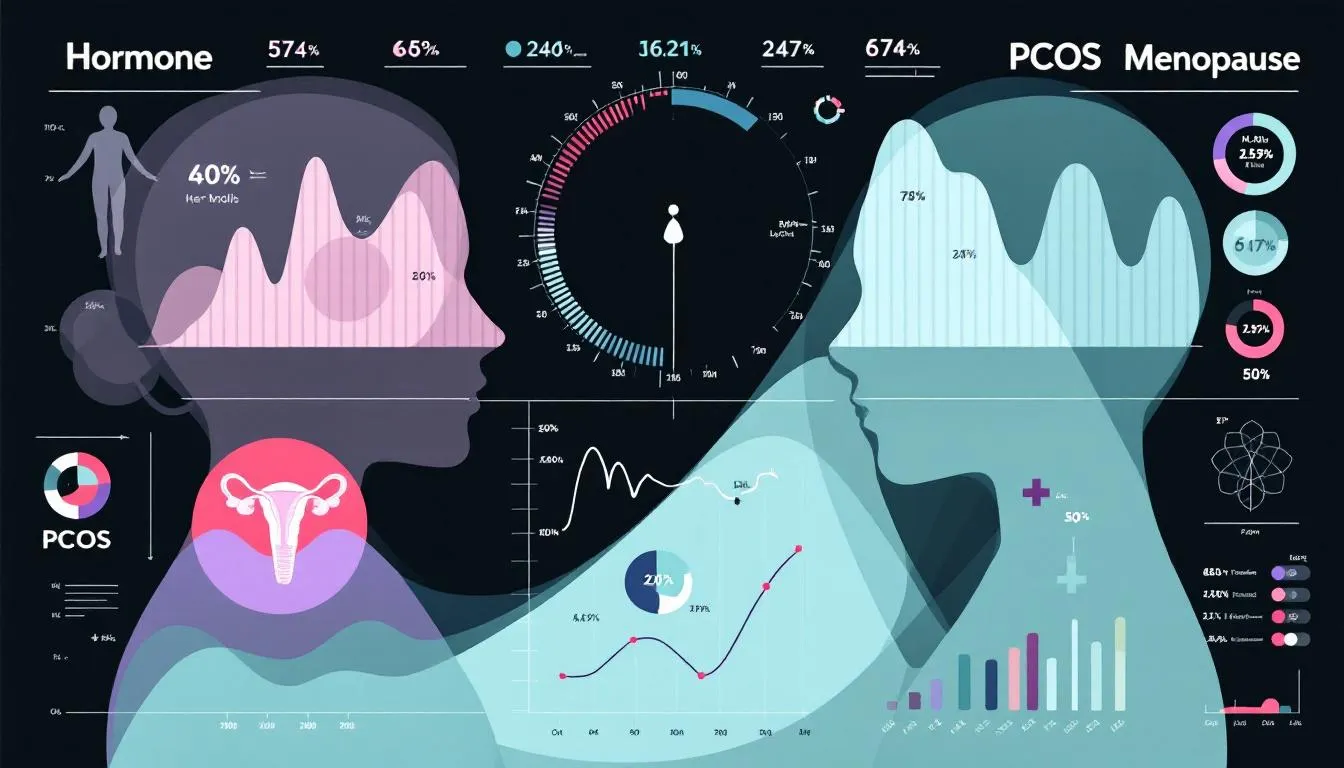A hormone profile measures various hormone levels in your blood to identify imbalances that can affect your overall health. This test provides crucial insights into your metabolic functions, reproductive health, and mood. By understanding your hormone profile, you can address any issues proactively and improve your well-being.
Key Takeaways
- A hormone profile test evaluates multiple hormone levels in the blood to detect imbalances affecting health, especially in women.
- Understanding key hormones like estrogen, progesterone, and thyroid hormones is vital for diagnosing conditions such as PCOS, infertility, and metabolic disorders.
- Effective management of hormonal imbalances involves lifestyle changes, medical treatments like hormone replacement therapy (HRT), and regular monitoring of hormone levels.
What Is A Hormone Profile Test?

A hormone profile test evaluates multiple hormone levels in the blood, helping to detect imbalances that could impact your health and well-being. These tests are particularly important for women, as they can uncover underlying issues related to fertility, menstrual health, and overall wellness. Analyzing specific hormone levels allows healthcare providers to establish a clear picture of your hormonal balance and identify potential issues.
Hormone profile tests diagnose various conditions, including menopause, polycystic ovary syndrome (PCOS), thyroid disorders, and infertility. Measuring sex hormones, thyroid hormones, and adrenal hormones provides crucial insights that guide treatment plans and promote optimal health.
Understanding your hormone levels can empower you to take control of your health and address any issues that arise.
How Hormone Levels Are Measured
Hormone levels are most commonly measured through blood tests, which offer comprehensive insights into various hormones in the body. Blood samples are typically used because they provide a reliable and detailed assessment of hormone levels, making them the gold standard for hormone testing. The accuracy of these tests depends on timing, especially for women, as hormone levels fluctuate throughout the menstrual cycle. Scheduling blood draws during the same phase of the menstrual cycle each time ensures the most accurate results.
Scheduling your hormone profile test during the appropriate phase of your menstrual cycle is vital for obtaining reliable results. For example, testing during the luteal phase, around day 21 of a regular cycle, provides accurate readings for progesterone levels. Consistency in timing ensures that the test results reflect true hormone levels, helping to identify any imbalances accurately.
Importance of Hormone Balance
Maintaining hormonal equilibrium significantly influences mood, metabolic processes, and menstrual health. Balanced hormone levels regulate metabolic functions, mood stability, and reproductive health. Hormones like estrogen play a significant role in regulating the menstrual cycle and maintaining reproductive tissues. Fluctuations can lead to symptoms such as mood swings, weight changes, and irregular menstrual cycles.
Hormonal balance is fundamental to overall health, affecting emotional well-being, physical health, energy levels, and weight management. Understanding and maintaining hormone balance can help mitigate these issues, promoting better overall health and quality of life.
Key Hormones Analyzed in a Female Hormone Profile

A female hormone profile typically includes several key hormones crucial for reproductive health and overall well-being, including female hormones such as female hormone profile results:
- Estrogen
- Progesterone
- Testosterone
- Follicle-stimulating hormone (FSH)
- Luteinizing hormone (LH)
- Thyroid hormones
- Adrenal hormones
Understanding their levels provides valuable insights into determining your health.
Here’s a closer look at each of these hormones, their significance, and their impact on the body.
Estrogen Levels
Oestrogen regulates the menstrual cycle and supports reproductive functions, contributing to the development of secondary sexual characteristics. Beyond reproduction, oestrogen also significantly affects bone health and other bodily functions.
Imbalances in estrogen levels can lead to various health issues, including menstrual irregularities and bone density problems.
Progesterone Levels
Progesterone prepares the uterus for pregnancy and maintains it if conception occurs. It supports early pregnancy stages and ensures the proper development of the uterine lining.
Low levels of progesterone can lead to difficulties in maintaining pregnancy, while high levels can indicate other health issues.
Testosterone Levels
Testosterone, though commonly associated with men, is also important for women. It influences:
- reproductive health
- muscle and bone density
- mood
- sex drive, contributing to sexual desire and overall emotional well-being.
Imbalances in testosterone levels can lead to health issues such as polycystic ovary syndrome (PCOS).
Follicle Stimulating Hormone (FSH)
FSH regulates the menstrual cycle and promotes egg development in the ovaries. The FSH test evaluates its concentration in the blood and helps diagnose issues related to the pituitary gland, ovaries, or testicles.
Doctors often recommend an FSH test to investigate infertility issues or irregular menstrual cycles. Abnormal FSH levels can indicate various health issues, including problems with the pituitary gland or ovaries.
Luteinizing Hormone (LH)
Luteinizing Hormone (LH) triggers ovulation and regulates the menstrual cycle. LH levels indicate reproductive health status and are often evaluated in diagnosing conditions like polycystic ovary syndrome (PCOS).
Understanding LH levels is essential for assessing fertility and overall reproductive health.
Thyroid Hormones
Thyroid hormones control metabolic processes and energy levels. They regulate metabolism, energy production, and overall health. Hormone testing is key in diagnosing thyroid dysfunction, significantly affecting metabolic processes.
Measuring thyroid hormone levels is crucial for identifying conditions like hypothyroidism and hyperthyroidism that impact metabolic rates.
Adrenal Hormones
Adrenal hormones, such as cortisol, manage the body’s response to stress and maintain metabolic functions. They regulate energy, mood, and overall health. Understanding steroid hormone adrenal hormone levels is essential for diagnosing issues related to stress response and metabolism.
Hormone tests for adrenal hormones can help identify imbalances that may affect your health and well-being.
Understanding Your Hormone Profile Results

Interpreting your hormone profile results helps in understanding your overall health and identifying potential issues. Hormone tests provide vital insights into fertility, menstrual cycle status, and other health concerns. Understanding your hormone levels allows you to take proactive steps to address any imbalances and improve your health.
Here’s an overview of normal and abnormal hormone levels, common symptoms of hormonal imbalance, and when to seek medical advice.
Normal vs. Abnormal Levels
Hormonal imbalances occur when hormone levels deviate from normal ranges, leading to health complications. For instance, testing levels of FSH and estradiol can provide insights into menopause, although fluctuating levels may not always be reliable indicators. Hormone testing is also crucial in infertility assessments, identifying imbalances that may hinder conception.
Understanding the difference between normal and abnormal levels is essential for diagnosing and managing health conditions effectively.
Common Symptoms of Hormonal Imbalance
Common symptoms of hormone imbalance include mood swings, weight fluctuations, and irregular menstrual cycles. Testosterone influences mood and sexual desire, with imbalances potentially affecting overall well-being. Symptoms like fatigue, decreased libido, unexplained weight gain, and depression can indicate a hormonal imbalance, and monitoring testosterone results can provide valuable insights.
Recognizing these symptoms is the first step towards seeking appropriate treatment and achieving hormonal balance.
When to Seek Medical Advice
Consult a healthcare provider if persistent symptoms of hormonal imbalance affect daily functioning. Seek medical advice if you experience persistent or severe symptoms that impact your quality of life.
Regular health check-ups can help identify potential side effects or complications from hormonal treatments. Early intervention and professional guidance are crucial for managing hormonal imbalances effectively.
Conditions Diagnosed Through Hormone Profile Testing

Interpreting hormone profile results can identify various health conditions based on hormone levels. Abnormal levels can indicate issues such as:
- Menopause
- Polycystic ovary syndrome (PCOS)
- Thyroid disorders
- Infertility
Understanding these conditions and how hormone testing can diagnose them is essential for effective treatment and management.
Here are some common conditions diagnosed through hormone profile testing.
Menopause
Hormone testing can confirm menopause, particularly in individuals with premature menopause or menstrual irregularities. Elevated follicle-stimulating hormone (FSH) levels are a common indicator, though fluctuating hormone levels can complicate diagnosis.
Hormone replacement therapy (HRT) is a common approach for managing symptoms related to menopause and other hormonal deficiencies. It can be tailored to meet individual needs, providing relief from various symptoms related to hormonal imbalance.
Polycystic Ovary Syndrome (PCOS)
Hormonal assessments for PCOS often include measuring levels of androgens to identify excess testosterone, which is common in this condition. Blood tests for PCOS can differentiate this syndrome from other conditions that may cause similar symptoms, such as thyroid issues or adrenal disorders.
Diagnosing PCOS involves a combination of clinical evaluation, hormone level assessments, and imaging studies. Lifestyle interventions, such as weight management and dietary changes, are often recommended alongside hormone testing for better management of PCOS.
Thyroid Disorders
Thyroid hormones regulate the body’s metabolism, energy levels, and overall health. They influence physiological processes such as:
- Weight management
- Heart rate
- Body temperature Hormone testing can identify abnormalities in thyroid hormone levels, aiding in the diagnosis of conditions such as hypothyroidism or hyperthyroidism.
Early diagnosis and treatment are essential for managing these conditions effectively.
Infertility Issues
Hormonal balance is crucial for fertility as it regulates various reproductive processes. FSH, for example, is essential for the development of ovarian follicles and helps assess fertility and menopausal status. Hormone testing, including FSH levels, is integral in identifying and diagnosing fertility issues.
Understanding and addressing hormonal imbalances can improve the chances of conception and successful pregnancy, as they are often produced in various form by various factors.
Preparing for Your Hormone Profile Test

Preparing for your hormone profile test is crucial for obtaining accurate results. Schedule your hormone profile test during specific times in your menstrual cycle for the most accurate results.
Follow pre-test instructions, which include fasting and consulting your doctor about any medications that may affect test outcomes. Proper preparation ensures that the test results accurately reflect your hormone levels, providing valuable insights for diagnosis and treatment.
Scheduling the Test
Timing of the blood test is crucial, as hormone levels can vary significantly throughout the menstruation cycle. Women should schedule blood tests for hormones on specific days of their menstrual cycle to ensure proper analysis.
The best time to schedule hormone tests is typically during the luteal phase, around day 21 of the cycle, to ensure accurate progesterone levels. Alternatively, the early follicular phase, around day 3 of the menstrual cycle, is also an ideal time for hormone testing.
Pre-Test Instructions
Patients should generally fast for 10-12 hours before the hormone test, allowing only water during that period. Staying well-hydrated facilitates blood sample collection and improves the ease of drawing blood on the same day.
Consult your doctor about any medications that may affect test outcomes, as certain drugs can influence hormone levels. Following these pre-test instructions ensures accurate and reliable test results.
Managing Hormonal Imbalances
Effectively addressing hormonal imbalances often involves a combination of lifestyle adjustments and medical interventions. A personalized approach that combines both lifestyle modifications and medical treatment options is essential for managing hormonal imbalances. This comprehensive strategy ensures that you can achieve and maintain hormonal balance, improving overall health and well-being.
Let’s explore some of the lifestyle changes and medical treatments that can help manage hormonal changes and decrease imbalances.
Lifestyle Changes
To maintain optimal hormone levels and support hormonal balance, consider the following:
- Follow a balanced diet rich in whole foods, healthy fats, and protein.
- Incorporate a nutrient-rich diet.
- Engage in regular physical activity.
- Practice stress reduction techniques.
Activities such as yoga and meditation can significantly aid in restoring hormonal balance by reducing stress levels. These lifestyle changes can have a profound impact on women’s health and help mitigate symptoms associated with hormonal imbalances.
Medical Treatments
Hormone replacement therapy (HRT) is a medical treatment aimed at supplementing the body with hormones it may no longer produce naturally, particularly during menopause. HRT is effective in alleviating menopausal symptoms such as hot flashes, sleep disturbances, and mood fluctuations by restoring hormone levels.
While HRT can provide significant benefits, it is important to discuss potential risks with a healthcare provider, as it may not be suitable for everyone. Consulting with doctors and undergoing regular blood tests can help tailor the treatment to individual needs.
Regular Monitoring
Consistent follow-up testing is crucial for tracking hormone levels and adjusting treatment plans as necessary. Regular assessments are essential for ensuring optimal health outcomes and maintaining hormonal balance. Conducting regular examinations allows for timely adjustments to treatments, helping to manage symptoms effectively and prevent complications. These methods have been tested to ensure their effectiveness.
This ongoing monitoring plays a key role in managing hormonal health and achieving long-term growth well-being.
Summary
Understanding your hormone profile is a powerful tool for maintaining health and well-being. By analyzing key hormones such as estrogen, progesterone, and testosterone, you can gain insights into your reproductive health, metabolic functions, and overall wellness. Hormone profile tests are invaluable for diagnosing conditions like menopause, PCOS, thyroid disorders, and infertility, allowing for targeted treatment and effective management.
Maintaining hormonal balance is crucial for women’s health, influencing everything from mood and energy levels to reproductive health and metabolism. By following the guidelines for preparing for hormone profile tests, interpreting the results, and managing any imbalances through lifestyle changes and medical treatments, you can take proactive steps towards achieving and maintaining optimal health. Understanding and addressing hormonal imbalances can lead to a better quality of life and improved overall well-being.
Frequently Asked Questions
What is a hormone profile test?
A hormone profile test is a comprehensive assessment of various hormone levels in the blood, aimed at identifying imbalances that may affect health. This test is essential for diagnosing conditions such as menopause, PCOS, thyroid disorders, and infertility.
How are hormone levels measured?
Hormone levels are primarily measured through blood tests, which offer a detailed overview of various hormones. It is essential to consider the timing of these tests, particularly for women, due to hormonal fluctuations during the menstrual cycle.
What are common symptoms of hormonal imbalance?
Common symptoms of hormonal imbalance include mood swings, weight fluctuations, irregular menstrual cycles, fatigue, and decreased libido. Acknowledging these signs is crucial for seeking effective treatment.
How can hormone profile tests help diagnose menopause?
Hormone profile tests are instrumental in diagnosing menopause as they reveal elevated follicle-stimulating hormone (FSH) levels, which indicate the transition to menopause. Therefore, these tests provide essential insights for guiding appropriate management, such as hormone replacement therapy (HRT).
What lifestyle changes can help manage hormonal imbalances?
Implementing a balanced diet with whole foods, engaging in regular physical activity, and practicing stress reduction techniques like yoga and meditation are effective lifestyle changes for managing hormonal imbalances. These adjustments can substantially enhance overall health and wellbeing.
